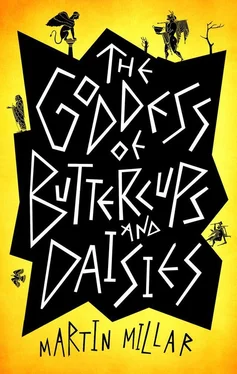Earlier in the day, Hyperbolus, Kleonike, Lamachus and Antimachus met in Euphranor’s house, discreetly entering his villa via the alleyway at the back, cloaked, their faces hidden. Their meeting was tense. Euphranor addressed them with the air of a very wealthy man who was unused to his wishes being thwarted.
‘When I put my money into this enterprise I was assured of success. But the peace conference is still going ahead, and so is Aristophanes’ play.’
‘Don’t worry, Euphranor, everything’s still on course,’ said Hyperbolus.
The priestess Kleonike gazed out from beneath her grey, hooded cloak and spoke quite mockingly. ‘It doesn’t sound like everything is still on course.’
‘Well maybe that creature you summoned to Athens isn’t as good as you said she was! Though she cost enough.’
‘Most of which I paid,’ said Euphranor.
‘Don’t blame me,’ said the priestess. ‘Laet has been highly effective. All you had to do was finish things off.’
General Lamachus frowned. He’d never liked the idea of involving a priestess. ‘We should never have gone down that route. Warriors trust their own strength.’
Kleonike laughed, infuriating the general.
‘Enough arguing!’ said Antimachus, Aristophanes’ producer. ‘We don’t have time for it.’
‘Don’t you start, Antimachus, said Euphranor. ‘You’ve failed worse than anyone. You were meant to sabotage Aristophanes and now I hear he’s got everything he needs.’
‘I kept my part of the bargain! I starved him of funds!’
‘Then where did he get the money?’
‘I don’t know.’
‘Well he got money from somewhere.’ Hyperbolus scowled at everyone in the room. He wore his best chiton. It was a respectable garment but it didn’t make him look any less intimidating. ‘We’ve got four hours before the play begins. We have to either delay it or sabotage it. It must not go well. If the audience all start cheering for peace, it might affect the delegates.’
‘How are we meant to sabotage it?’ asked General Lamachus.
‘Any way we can. Bribe the actors. Steal their props. Kleonike, can you send Laet down to the theatre?’
‘She’s already on her way.’
‘Good. The play must not go on.’
Citizens Arrive at the Theatre
The Theatre of Dionysus Eleuthereus lay under the shadow of the acropolis, in the south of the city, close to a smaller theatre, the Odeon, built by Pericles, used for music and singing. It was in this smaller theatre that the proagon had been held, when the titles of the upcoming plays were announced and the judges were selected. The Theatre of Dionysus was a good deal larger, a circular, open-air space holding twelve thousand people. The acoustics were excellent, though the wooden benches were not especially comfortable, particularly for an audience who might spend the whole day there. People laid their cloaks on the benches to make it easier; wealthier citizens brought their own cushions, or hired them. Some days the theatre could be a scene of extreme emotion, as the plays of Athens’ famous tragedians were performed in an atmosphere of religious reverence. On the last day of the Dionysia, the atmosphere changed to one of raucous amusement, as the comedies were staged, comedies which were famous all over Greece for their wit, obscenity and irreverence. The adult population of Athens crammed into the theatre. There were guests too, visitors to the city, and ambassadors from foreign states. Notably, there were representatives from the other Greek states which paid Athens tribute in exchange for protection.
As Nicias made his way to the theatre, he noticed the atmosphere was more subdued than at previous festivals. Perhaps that was to be expected, given the difficult times Athens had been going through recently. The unseasonal heat had not dissipated, and people were feeling it. There was anxiety too. Everyone seemed to know someone who’d been involved in recent misfortune, from merchants who’d lost money on deals, to women who’d lost their lives in childbirth. It had been the unluckiest month anyone could remember, and no matter what a citizen did to make things better, it always went wrong. It was as if the city had collectively lost its ability to make the right choice in anything. It didn’t bode well for the peace conference.
If the mood was less festive than usual, it was not entirely sombre. People were glad of a few days’ break from worrying about the war, and listening to politicians screaming insults at each other in the assembly. Whatever might happen in the coming weeks, they were at least sure to laugh at the plays of Aristophanes, Eupolis and Leucon. People looked forward to seeing three comedies, one after another, although even that number carried a reminder of their troubles. At one time there had been five comedies, but the number had been reduced, because of the war.
Luxos made his way to the theatre on his own. Metris had returned to her duties with Bremusa. Luxos missed her, though his spirits had been bolstered by the picnic they’d shared on the beach. He had already written twenty-eight lines about sharing their bread and cheese, and there was a lot more to come.
He’d considered boycotting the last day of the festival in protest at it not involving him in any way, but no Athenian could be truly comfortable missing out on such a huge communal event.
I’ll just have to sit through that hack Isidoros reciting his useless poetry. I will watch with dignity. Maybe mutter a little abuse. Nothing extravagant.
He wondered how Aristophanes’ play would be received. Luxos had seen a lot of it in rehearsal. None of it seemed to be working that well, though he could see its potential if it all came together. Recent events had not endeared Aristophanes to Luxos. Nonetheless, the young poet wanted the war to end. If Aristophanes’ play could help, then he probably should support it.
Luxos was swept up in the great mass of citizens approaching the theatre. For a short time he experienced the feeling of unity, of commune, of being part of a great body of people all striving for the same thing: the Athenians, proud of their city, and their democracy, and their arts. It was spoiled when three youths, part of a wealthy family, flanked by servants, poked fun at him.
‘What’s that? Is that meant to be a lyre?’
‘Looks like something washed up on the beach.’
‘So does he.’
‘Get a haircut, you look like a barbarian.’
Luxos sighed. He was used to criticism, both personal and artistic, but he wasn’t immune to it. As the theatre came into view, his spirits fell further. Here he was, in the very heart of Greek culture, and he couldn’t make any impression. He wished that it wasn’t so hot. He wished Metris was there. He wished someone would listen to his poetry.
Leucon’s comedy was nearing its conclusion. It had gone well with the audience but Aristophanes wasn’t paying attention. He had no regard for Leucon, and was too busy double-checking that everything was ready for his own company’s performance. After their final rehearsals, Aristophanes was feeling optimistic. There would be no repeat of last year, when the panel of five judges had denied him first prize.
One of the most scandalously corrupt decisions ever seen in the Athenian theatre!
He entered the backstage area to make a final check. Hermogenes ran towards him, a look of alarm on his face.
‘What’s the matter?’
‘Our penises have gone missing.’
Aristophanes stared at him blankly. His assistant seemed to be talking gibberish. ‘What do you mean “Our penises have gone missing?”’
Читать дальше












